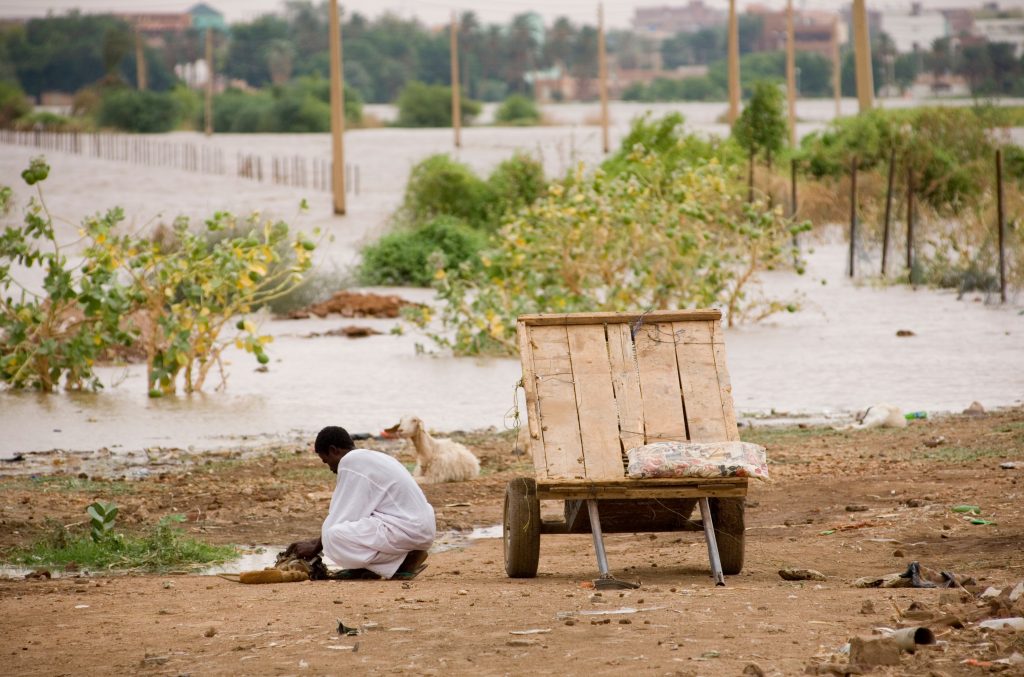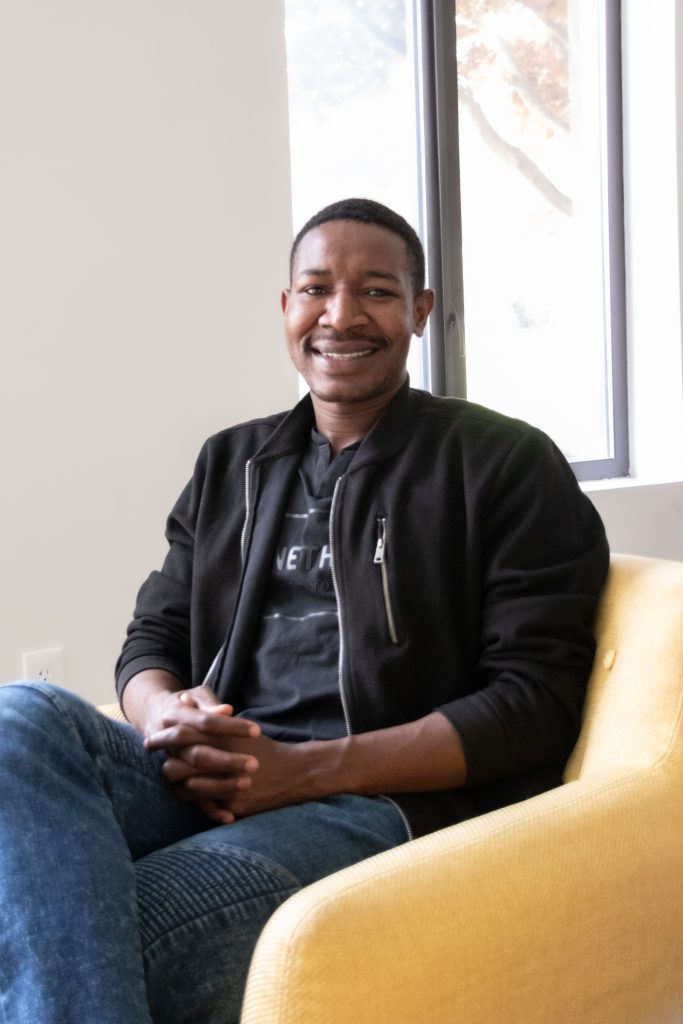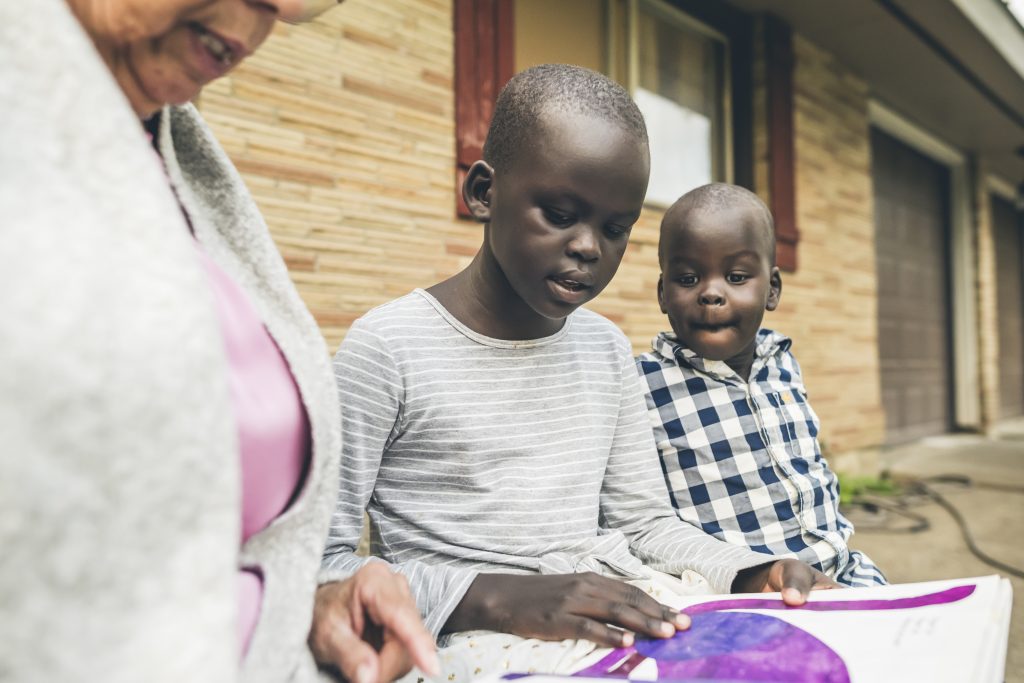In the lush green fields of Sudan lived a young boy and his family. The boy’s name was Abdulazak. His father was a farmer in a time when food was abundant, and the people were kind. Abdulazak raised animals on the farm. Yet, he always found time to sit with his grandmother.
“Things are changing a lot. Nobody notices these changes,” said Abdulazak’s grandmother. Although she had never gotten an education, she was extremely wise.
Abdulazak always valued what his grandmother said. “She would know things ahead of time before anybody else – more than anybody else what the future would look like.”
Abdulazak would not forget her words: “Without education, even a cup of water you cannot find to drink.”

Abdulazak enrolled himself in school.
War raged in Sudan, and every day, it crept closer to the farm. Discrimination was high between different groups that resided in the country. Distant relatives had already been displaced to other countries as the fighting swept across the land.
Abdulazak remembered when his father said, “We cannot be living here. If we are here, things are coming to our area – so we have to leave.”
In the dark of the night, the family stole away. While traveling, they claimed that they were visiting the next village. If their true intentions were revealed, their family could be killed.
When Abdulazak talked to his father, he recalled him saying, “We are going to places hopefully, that you guys are going to get a better education, and maybe learn and come back to help your family, yourself and your people.”
They were going to a camp for internally displaced people in Sudan. Everyone believed that those who got to the camp would have a chance to go to places like the United States. As a child, Abdulazak was certain he was going to the United States!
Is this the United States?
The trip was extremely long. Sometimes, Abdulazak’s father would sleep out in the rain after finding a place to shelter the family. It seemed to Abdulazak they could have traveled anywhere in the world by the time the family reached the camp.
When he saw the rows of tents, he asked his father, “Is this the United States?”
It was not. The family was given a tent, and Abdulazak continued to go to school…this time within the borders of the camp. They lived there for two years before they were transferred to another camp, this time in Kenya.
Again, Abdulazak asked the question, “Is this the United States?”
It was not. He could see the familiar tents and tired faces. Only this time, the camp was bigger and the education was better. The family lived at this camp for six years.
Abdulazak began to attend boarding school in Kenya. There, he learned subjects such as basic English. After a few years, the family’s case went to the UNHCR for processing. In order to make the interviews and medical check ups, Abdulazak needed to go back to the camp and continue his education there. The interview process took two years and wasn’t completed until 2012.
Abdulazak landed in Spokane on July 10, 2012. Although the heat was similar to Kenya, the city was different than anything he had seen before. Abdulazak knew he wasn’t in Kenya. He didn’t need ask where he was.
He was in the United States.
An educational miracle
He’s about 18. He’s not going to finish his education. Better to enroll him in adult education so he can start working…
The man registering the children in public school didn’t realize how much Abdulazak yearned to go to high school. Luckily, the interpreter convinced the registrar to go ahead and put him down on the list.
As they left, the interpreter told Abdulazak to enroll in adult education summer classes. Abdulazak did and was placed in level 4 English classes. Even though he had a chance to get his GED and continue his career through the center, he longed for a place surrounded by his peers.
“I still felt like I was a child…I wanted to go to high school.”
In September, Abdulazak escorted his sister to Ferris High School where he expected to drop her off. It was there that a teacher greeted them.
“Welcome, welcome. We’ve been waiting for you,” he recalled her saying. Abdulazak hesitated, but at that moment, the woman set aside his worries. “For ALL of you.”
“My name is here?” asked Abdulazak. She confirmed that his name was on the list.

It was a miracle! Abdulazak could finish his education.
From the start, Abdulazak was on a mission to go to college. Each morning, Abdulazak started his day with a zero-hour class before school started, and finished with after school classes. In addition, he attended ESL classes alongside other immigrant students.
“It was one of the most rewarding experiences…I still have close friends that I have made from Mexico, Nepal, Thailand.”
After finishing high school, it was important to Abdulazak to be near family. Supported by several scholarships, he decided to attend Eastern Washington University to pursue International Relations and Communications.
“I love that school. I have a great connection with the teachers there – the professors.”
The Ronald E McNair Scholarship program assisted Abdulazak in navigating college as a first-generation student. He was exposed to many aspects of the academic field. Alongside his advisor, Abdulazak published Identity in Foreign Policies in African Countries.
Currently, Abdulazak is working towards his masters degree in African Diaspora Studies and a PhD in International Relations. He looks forward to working in education, a nonprofit or the government.
Close to Abdulazak’s heart is improving the education of Sudanese immigrants. “Right now, I don’t know anybody else who is pursuing their PhD.”

Recently, Abdulazak started a nonprofit called Kudusi for the Advancement of Rising Generations. With an academic and cultural emphasis, Abdulazak seeks to support Sudanese students in accessing and navigating resources for higher education. He is certain that by tapping into their personal stories, students will be able to attain scholarships – which makes higher education possible.
“If they can articulate their stories well and write and put in the effort, they can get more support… Because of what they went through, they have a lot more resilience.”
Abdulazak appreciates the Spokane community and the impact the people have had on his family. The city, the people, schools…all had a great impact on his life. Every rule, law, and system in Spokane is what he calls “flawless.”
“The city has been sort of a blessing for us…I love the city. I genuinely mean it.”
Abdulazak continues to give back wherever he can, and sometimes he can even be seen volunteering at World Relief. Even though war still ravages the plains of Sudan, Abdulazak knows that he can make a difference for those who are in his community.
“There’s a lot more [opportunities] to give back here than anywhere…It’s about where you are too. If you can help anybody within your environment, it’s the same as the one you’re thinking about helping somewhere else.”

